
Source: Wendi Stitzer
Hard of hearing student-athlete’s success, character inspires others
Hailing from a small community in southwestern Wisconsin, Boscobel’s Job Wetter is showing deaf or hard of hearing students that they too can participate at a high level in high school sports.
BOSCOBEL, Wis. (WMDX / WRCO / WLCX) – On a warm but overcast September practice, Boscobel football players walked through offensive plays, a routine part of preparing for games.
“If you hear this word—” one of the coaches called out the word to signal that the play would change from what was called in the huddle — “We’re changing the play.”
The practice, known as an audible, is extremely common in football: one person speaks a word, and the rest of the team hears it and understands it.
For one Boscobel student-athlete, however, this method of changing plays presents a challenge.

Job Wetter, a four-year player and senior for the football program, is hard of hearing. While he wears hearing aids, it is still challenging for him to understand what people are saying if they are not looking directly at him, because Job has adapted to his hearing loss by learning to read lips in order to understand what people are saying. His father, Lance, who coaches him in wrestling, said it’s something that even he forgets sometimes because his son has become so good at reading lips that he doesn’t always remember to face him when talking to the team.
“I forget as a coach, even being his father, that if I turn my back to him, he can’t see me, and therefore can’t ‘hear’ me,” Lance said.
Job is Lance’s oldest child and has tried hard to follow in his father’s footsteps, right down to wearing the same number his dad wore when he played for Boscobel in the early 2000’s, number 12. He’s also an accomplished track athlete, going to state as an alternate with the 4×200 relay team this past spring, and a four-year wrestler in one of the most competitive areas for the sport in the state, southwestern Wisconsin.
Despite being hard of hearing, Job has managed to succeed in sports, which has inspired other deaf and hard of hearing students in southwestern Wisconsin to seek him out. One such moment was after a recent Boscobel football game, when he met the opposing coach’s son, who is also hard of hearing. His journey to becoming a standout student-athlete, however, had some twists and turns, especially as he began trying out for sports.
You can trace the beginning of the journey all the way to birth. Job was born prematurely and spent a month in a NICU. During that time, nurses discovered that Job wasn’t reacting to sounds like other babies, as Job failed his hearing test.
“We’ve known since the first week or two of his life that he wasn’t able to hear well,” Lance said. “For us, being the first kid, it was kind of like, oh!” Lance added that they had no other comparison to learn how to raise a child who was hard of hearing.
Lance, the pastor at Global Methodist Church in Wauzeka and Mt. Hope, and Emily, Job’s mother, who is a social worker at Crossing Rivers Health in Prairie du Chien, agree that their son has adapted well despite not being able to hear well.
“He’s done a great job of overcoming things, like he’s gotten good about communicating with people,” Lance said. “He’s handled it a lot better than I could… For him to follow conversations among multiple people is amazing.”

He added that in some situations, Job can actually do better than people who have their hearing.
“He can translate for me sometimes in a crowded room, because he can read lips,” Lance said. “He can even read lips from across the room, so even if he’s not meant to hear something, he can still understand what people are saying from that far away.”
Job’s longtime interpreter, Megan Yeomans, an advocate for deaf and hard of hearing people, said that what he’s been able to do is unbelievable.
“Over the years, I’ve seen him grow into a confident, hardworking young man who faces challenges with great determination,” Yeomans said. “Job does not let his hearing loss hold him back.”
Challenges in competition
‘Miss Yeomans,’ as Job refers to his interpreter, has been a fixture in Job’s life since Job was in third grade. Her classroom role grew to include sports practices and games, school events, and even on job sites as Job gets closer to graduation next spring.
She has seen first-hand the challenges Job has overcome in order to compete in athletics.
“Even when he encounters obstacles or negativity, Job pushes through with strength that sets him apart,” Yeomans said.
Lance said that early on, he didn’t think that Job’s hearing loss didn’t affect him as much as it did once he got to about middle-school competition, but he began noticing as a coach watching film that there were things that he was missing.

“Things like not hearing the whistle in wrestling, I realized then how much he misses,” Lance said. Communication with teammates, coaches, and officials was also a struggle since he began competing in sports, with some officials not understanding how to adapt to Job’s hearing loss. Others, Lance said, went out of their way to make sure Job had an equal playing field.
In middle school, that issue presented itself on a number of occasions, leading to conflict with opposing players, coaches, parents, and fans when Job would play beyond the whistle, confused at first as to why people were upset with him.
“When he got to junior high, it got to be a problem because of late hits,” Lance said, noting that there were dust-ups in both wrestling and football.
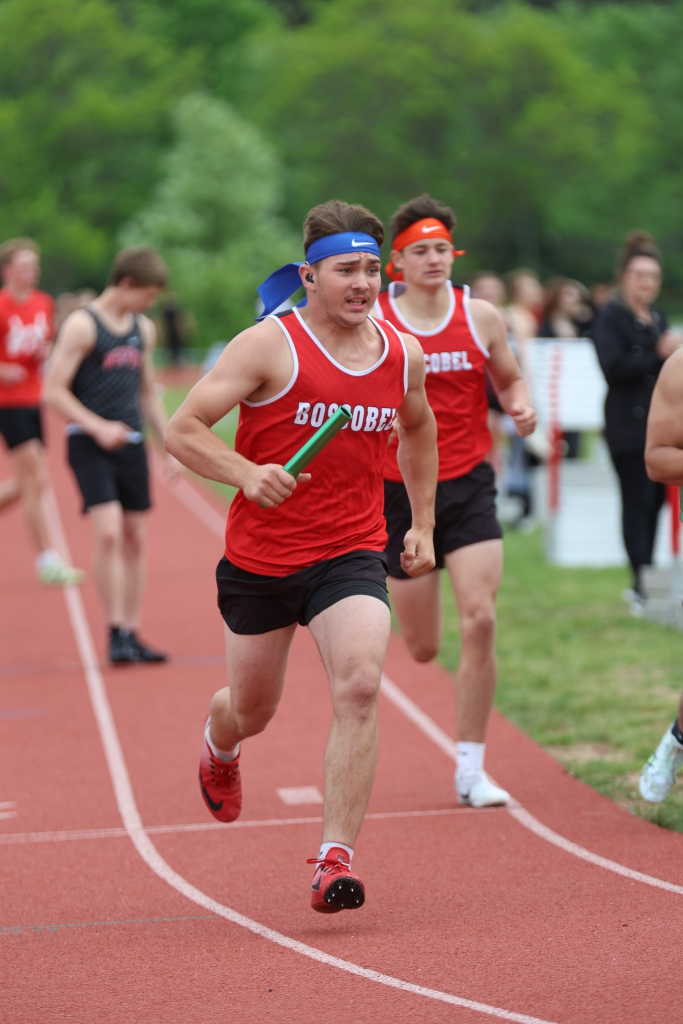
It also caused Job’s parents to consider whether playing sports was something he would be able to do.
“We weren’t sure this was beneficial to him, because people thought he was being cheap,” Lance said. “But most of the time, he didn’t know what’s going on in that moment.”
Job said that those early days were “tough sometimes,” and that the biggest issue was that other people didn’t know that he was deaf.
“It’s harder for other people than it is for me,” Job said. “Everyone else, they have to adapt.”

A particularly harsh moment in Job’s career happened when he was a freshman in football. A play was blown dead, but Job continued through the play, unable to hear the whistle, and tackled the opposing quarterback. The opposing player suffered a minor injury on the play, which drew the player’s parents from the stands to yell at Job.
“I remember being on the sideline one second and out in front of this parent the next,” Yeomans said. “It was pretty tense.”
On the game film, the parent confronts Job while coaches separate players from each team. Job, meanwhile, crouched down while the parent yelled at him.
“You shouldn’t even be out here,” the parent yelled. “You don’t belong on this field!”
The incident was a public reminder that even with all of the hard work he had put in, Job still had challenges in front of him if he wanted to play sports.
“After a while, you sort of get used to it,” Job said, referring to people saying he shouldn’t be playing sports. “It pushes me to prove they’re wrong.”
Gridiron Greatness
Job’s style of play can be described as relentless — he’s leading Boscobel in tackles this season, and has nearly 200 for his career, with 20 tackles for a loss in that total. The constant effort has impressed everyone around him.
“On the field, he gives his all every play, showing what perseverance truly looks like,” Yeomans said. “His commitment and resilience are a reminder that success isn’t just about talent, but about refusing to give up no matter what stands in your way.”

Four years as a varsity starter on the defensive line has also allowed Job to take on other important roles, such as kickoff specialist, running back, and occasional work on the offensive line. He’s also wrestled all four years of high school, where he’s currently ranked amongst the best in the state at 165 pounds, and has surprisingly good speed for a lineman, which has enabled him to become part of Boscobel’s state-qualifying track relay team.
“The best thing about coaching Job is that his mental toughness and conditioning is second to none in the room,” Lance, who is the head coach of the Boscobel/Wauzeka-Steuben wrestling co-op, said.
Job currently leads the state in forced fumbles with four in four games, helping Boscobel to lead the entire state in that stat nearly halfway through the season. He’s forced seven fumbles in his career, just short of a school record set in the 1970s.
Since the data isn’t reported to either the Wisconsin Interscholastic Athletic Association or to the Wisconsin Department of Instruction, there’s no known number of hard of hearing or deaf students playing sports in Wisconsin. The DPI counted 1,657 hard of hearing students in public schools as of two years ago, but acknowledged that it is likely an undercount due to the fact that schools don’t need to report that data. Regardless, there are few stories of top student-athletes in Wisconsin that have enjoyed as much success as Job, which makes his work that much more remarkable.
“Job does not let his hearing loss hold him back, especially when it comes to football — a sport that demands focus, grit, and heart, “ Yeomans said.
When it comes to sports, his parents said that without Megan as his interpreter, he’d never be able to compete.
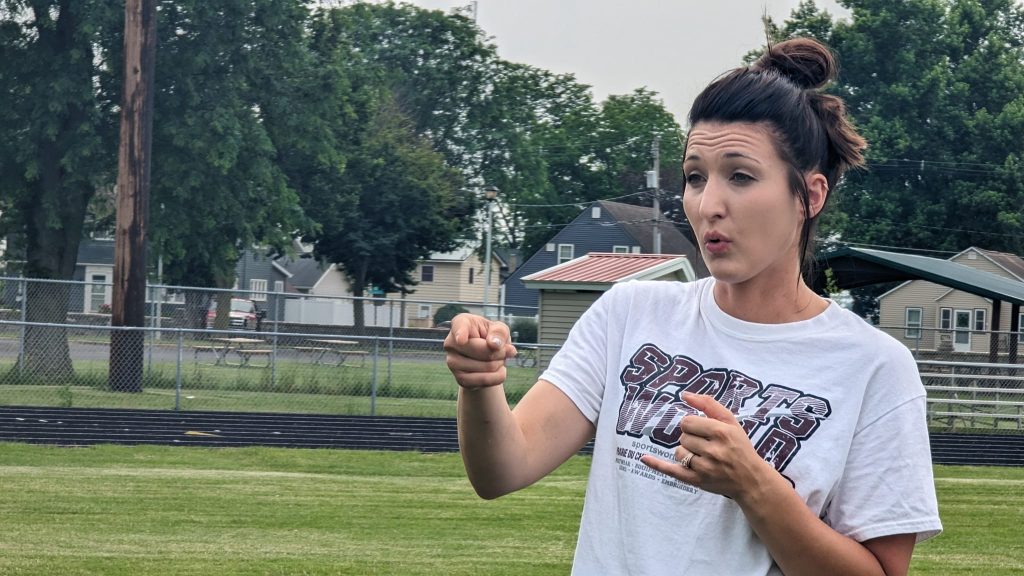
“Megan is the best. I seriously do not think Job would have been able to play sports to the level he does or even participate,” Lance said. “Her level of commitment is second to nobody – she’s in the classrooms, she’s at practices, she’s at games, she’s at the job site with Findorff. She goes so above and beyond. She is just absolutely amazing.”
“Miss Yeomans is my school mother,” Job said. “She makes sure I have everything I need to do well here too,” he added while pointing at Boscobel High School.
There’s a lot of support for Job in Boscobel in addition to his family and Megan.
“I’m lucky to have had great teammates, friends like Chanse Johnson, and of course my parents and coaches,” Job said. “Without my parents, I wouldn’t be here without them.”

He said that his coaches have been understanding of his hearing loss, and his favorite coaches have gone out of their way to make sure he has everything he needs to be successful.
“I give a lot of credit to the school,” Lance said. “One of his wrestling coaches, Taylor Halverson, advocates for Job when it comes to his hearing loss, but calls him out on it if he uses it as a crutch.”
In addition to Yeomans, Pam Kurihara, a deaf and hard of hearing teacher for CESA 3, has also been a big resource for Job, according to Lance. Yeomans is also a CESA 3 employee.
Job’s family said that the Boscobel Area School District has stepped up in accommodating his hearing loss, going so far as working with the WIAA to work on adding accommodations for deaf and hard of hearing student-athletes, as those accommodations never existed before. Lance said that Ed Boneske, Boscobel’s activities director, helped in getting those discussions going.

It’s also apparent that Job is one of the fan favorites for Boscobel community members who attend games, as Job is known for both his unrelenting competitiveness on the field, mat, or track, and away from competition, is happy-go-lucky and aloof. At one football practice, he encouraged middle school football students to try to toss a tackling wheel around him, and after a couple of tries, when it landed, he then wore it into a pass-catching drill.
With a full community of support, and success in athletics, it’s given Job another opportunity: To be a role model for other students with hearing loss.
‘A special moment’
Earlier this month, Boscobel took on perennial powerhouse Black Hawk/Warren, which most recently made it to the state finals just two seasons ago.
Before the game, Boscobel coaches let Black Hawk/Warren coaches and the game officials know that they had a player who is deaf. Being Job’s fourth year on varsity, it had become a routine part of the pregame safety meetings for Bulldogs coaches. However, on this day, rather than a simple acknowledgement of competing against a player who is hard of hearing, the head coach on the other sideline nodded his head and took a second before asking a personal question.
“Do you think Job would be OK with meeting my son after the game?” Desmond Breadon, Black Hawk/Warren’s head coach, asked. Breadon explained that his son was also deaf and hard of hearing, and he wanted his son, Mateo, to see that even with hearing loss, he could play football, a sport he loves.
Job, who is as easy-going off the field as tough as he is on it, wasn’t at all phased by the request. “Oh, yeah, of course, I’ll do it.”

After the game, Job made his way across the field to meet Mateo, where he was greeted with a hug. After an initial bout of shyness from Mateo, who is in elementary school, he opened up when Job knelt down next to him, took out his hearing aid, and showed it to Mateo.
“I see you have magic ears, just like me,” Job said. Mateo smiled and nodded. The two talked a little bit about football before taking pictures together.
Breadon said it was as special of a moment as he’s had in football as a coach and as a parent.
“That was a moment that can’t quite be put into words,” Breadon said. “To have Mateo continue to see there are other kids out there just like him and that he can do anything he wants in life and not let his lack of hearing keep him from it… Mateo loves football, so to see Job as a role model was huge.”
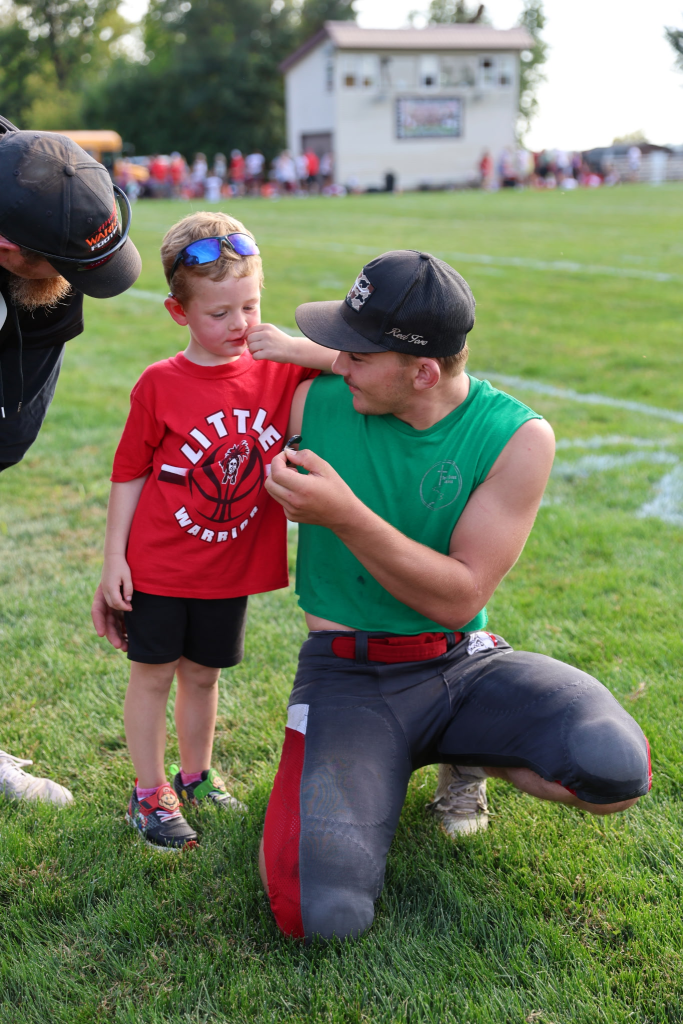
While he admits he never saw himself being a role model, Job said he likes the idea of having someone look up to him.
“I’ve always liked giving, not receiving,” Job said. “I didn’t have anyone older than me with hearing loss that would come and talk to me. It is neat having people come to me, because now there’s someone that can ask me questions and I’m happy to answer them.”
The moment itself was captured on social media, shared hundreds of times, and as of a few days after the meeting had been viewed hundreds of thousands of times. The photo views on the football team’s page alone are more than double (120,000) than the population of Grant County (52,000), where Boscobel, a city with a population just over 3,000, is located. The city is near the northeast corner of the county along the Wisconsin River.
On one of the pages that shared the post, a commenter noted that Job visited their classroom every week last year to speak to one of their students about wearing hearing aids and teach the class about being deaf and hard of hearing. The class learned enough sign language to do knock-knock jokes, according to the post.
Hundreds of other comments praised Job for his character and kindness across multiple posts about the moment, from school pages to sports pages to content aggregators. A couple of days after it went up, Job admitted that the attention “was kind of cool,” but was a little shocked that so many people had seen it — “Did you say over 200,000 people saw it?”
His story was also published regionally in newspapers this week, including locally in the Boscobel Dial. The newspaper chain that distributes the papers named him the student-athlete of the week for the southwestern area of the state as well. The moment also caught the attention of the WIAA, which is planning on featuring him as a student-athlete in a future update.
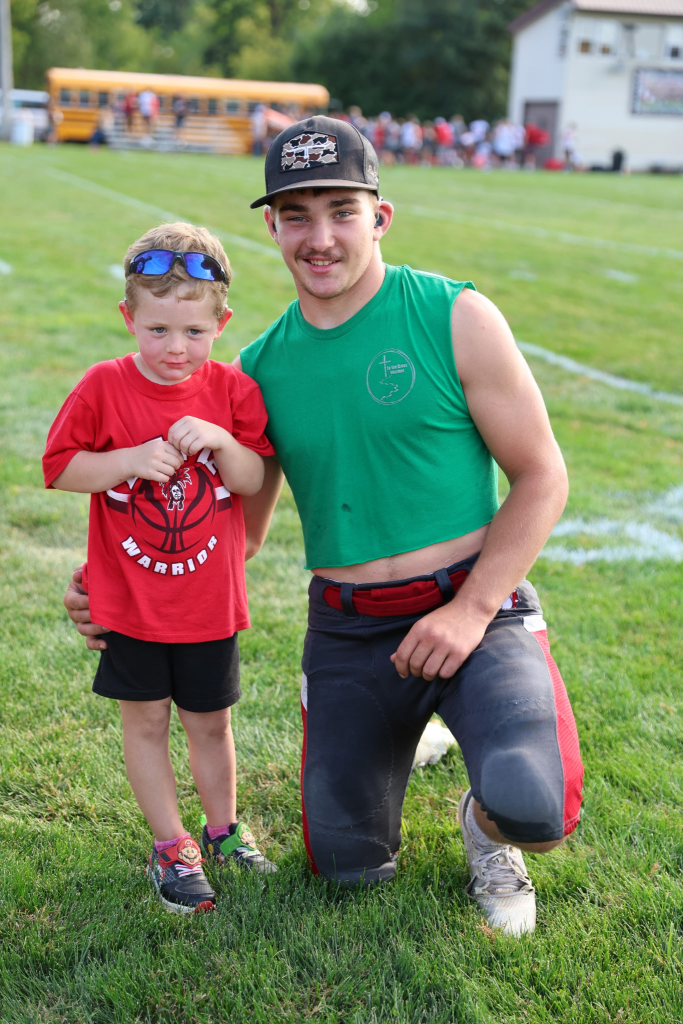
“Hey guys, I know that I’ve been in a lot of posts on social media and getting a lot of attention lately,” Job said in the final team huddle of the week before Boscobel took on top-ranked Potosi/Cassville in Week 5. “But I wouldn’t have been able to do any of this without all of you, my teammates. You’re the reason anyone is paying attention to me. Thank you.”
After the huddle, which ended with a very loud “1-2-3 Bulldogs!” breakdown, Job added, as he was walking off the field, that he never expected to be one of the best at anything, or that so many people would care that he met with a fellow hard of hearing student. “I’m glad to do it,” he said, adding a shrug and a smile before heading off of the practice field.
Future plans
It’s his senior year of high school, but Job already has a career planned out.
Currently, he has a youth apprenticeship with Findorff, the company that handled the construction of Boscobel’s $21.5 million referendum facilities project. Job worked on the facility himself, including, for example, as part of the crew that poured the concrete for the new gym floor. Because of his classroom work, and help from Boscobel teachers like Halverson and Jean Salzgeber, he’s now taking advanced-level courses full-time at Southwestern Wisconsin Technical College and earning dual credits.

Because of this, Job arrives most days to football practice in steel-toed boots and work clothes, quickly shedding his day job gear for shoulder pads and a different kind of hard hat to prepare for each week’s football game. The workmanlike attitude carries over to the gridiron, where he, along with other seniors on the team currently working in trades, toil in the grittiest positions on the field.
“I have had the privilege of working with Job since he was in third grade, and watching his journey has been nothing short of inspiring,” Yeomans said. “I am incredibly proud of the young man Job has become and look forward to seeing all that he will continue to accomplish on and off the field.”
If construction doesn’t pan out, Job’s parents expect that he could find himself in the family business — working with others in his community. Job’s father said that the moment with Mateo after the football game was part of what makes Job, Job.
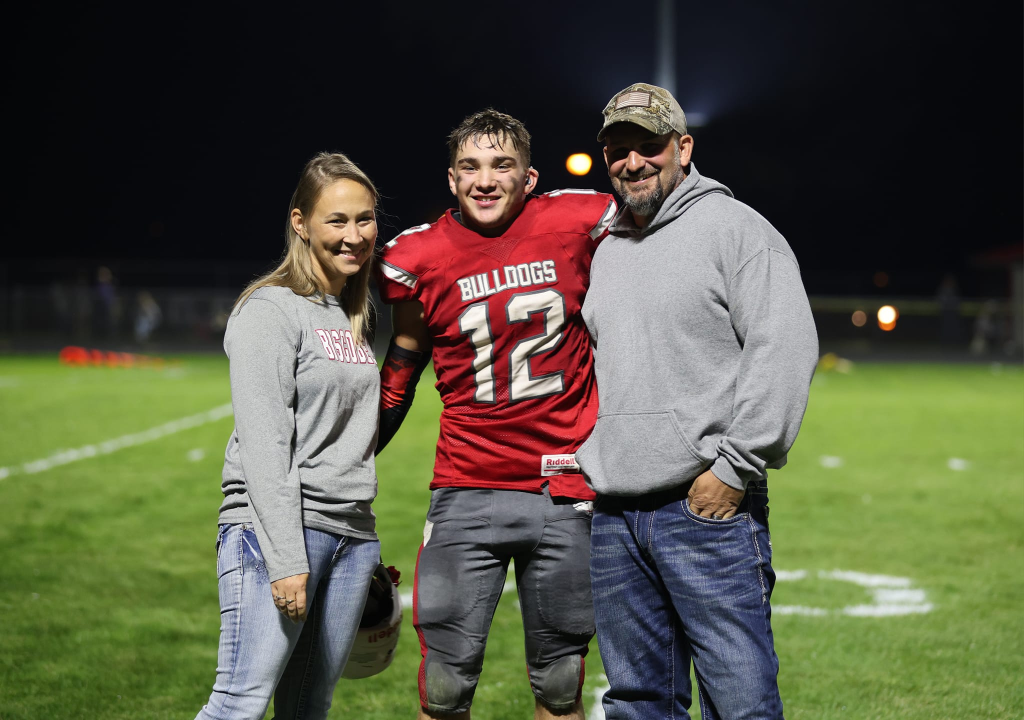
“Job has a heart for teaching and little kids,” Lance said. “I do think some day he will return into the coaching or teaching arena in his second career. He takes that big brother-protector-guardian type of role… He wants to be in their corner.”
Lance added that Job has matured in the ways that matter since some of the earlier conflicts in his athletic career, and said that he handles his emotions better than what other people might give him credit for. Job said that he’s gotten used to others not fully understanding everything about his hearing loss, and goes out of his way to make sure referees and opposing coaches know about it.
In addition to his classroom work and athletic success, Job has also volunteered hundreds of hours in the community with church mission trips, disaster relief in Iowa, and cleanup from the tornado that hit Boscobel in 2021. He also helps locally with church community members with tasks like landscaping, fencing, and farming. Job also takes part in the football program’s community service events, such as the annual public library book sale. When he’s not volunteering or doing work for his youth apprenticeship, he is also gaining trade experience with O’Kane Plumbing in Prairie du Chien.

Job will graduate next spring, the culmination of a high school athletic career that thrived despite the odds. He hasn’t given a lot of thought to what specifically comes next, but for now, he’s excited to continue to compete in sports.
If he knows it, he wouldn’t admit it, but based on the comments and messages from people inside and outside of the Boscobel community, by simply competing in sports, he’s already serving as inspiration for others who might doubt whether they can participate in activities that are more challenging for those who are deaf or hard of hearing. Even if he never thought he’d be a role model, Job has already sparked inspiration in at least one young person, and likely many more as people learn about his story.
“Job is an all-state character young man, and I’m super proud that Mateo calls him his new buddy,” Coach Breadon said.
“Wait a minute, how do we tell Job if we change the play?”
Boscobel’s players began asking out loud what they could do to signal to Job that they are calling an audible, suggesting everything from having a neighboring player tap him on the helmet to ‘just yell the new play louder’ (a joke, it should be noted, that Job smirked at because it was suggested by a teammate standing right in front of him).
It’s Job’s first year on offense after playing on defense every year prior. On defense, Job doesn’t need to hear a play call at his position, or hear when the quarterback calls for the ball. He can watch the ball until it is snapped, which is his cue to go. Boscobel coaches believe that part of his success on defense is being so good about going right when the ball is snapped, something that is challenging for others who can hear quarterback cadences to learn. Most players try to time their release based on sound rather than the sight of when the ball moves, but more experienced athletes work at watching the ball and go as soon as it’s snapped, a skill that Job mastered a long time ago.

Electronic communication devices are banned by the NFHS and WIAA, so an in-helmet device is a no-go. Similarly, players can’t wear electronic wristbands or other wearable technology to communicate plays. The only accommodation in the rule book for deaf student-athletes is that the start of the play can begin with a drum beat from the sideline. (Hearing aids are allowed as long as they don’t receive audio transmissions from a remote source, like a coach’s headset on the sideline or in the booth).
Luckily, Boscobel’s offense often goes off the snap already, as it is a spread offense that has cadences ranging from vocal cues to hand claps, so most of the offensive players are already trained to watch the ball.
As for what to do about changing the play, fellow senior Chanse Johnson, one of Job’s best friends who is normally a quiet, lead-by-example type, raised his arms and said, “Guys, I got this. I’ll get him to go where he’s supposed to go.”
Off the snap, Job crashes through the line, his trademark full-steam-ahead style that endears him to his coaches and frustrates opponents. The changed play worked, with Chanse using hand signals to get Job to the right spot.
“See guys, I got this,” Johnson said after the play ended. Job, jogging back to the offensive huddle, was all smiles as he tossed the ball back to the center.

Boscobel coaches move on to call the next play, with the quarterback returning to the huddle with the call. The quarterback looks directly at Job and gives the play to the team before lining up. As they walk to the line of scrimmage, Chanse, the quarterback, and two other players give a thumbs up to Job, looking for confirmation that he understands the play call. Job returns the thumbs up, nods, and gets set.
The subtle adjustments and efforts by coaches, teachers, and fellow students or athletes doesn’t go unnoticed by Job, either.
“I feel like I’m repeating myself, but I am lucky to have great coaches, teammates, and people around me,” Job said.
The proof of that feeling being reciprocated is everywhere, from social media posts talking about what an inspiration he is to others off the field to high fives in practices and games for making big plays on it. While there are some things Job can’t hear, the people around him this week said that he has been overwhelmed (in a good way) with all of the positive things people are saying about him. For a kid who has been hard of hearing since birth, the compliments and well-wishes from his community and beyond are being heard loud and clear.
Thank you to Job, the Wetter family, the Breadon family, Megan Yeomans, and Wendi Stitzer (who took most of the photos in this article) for their help in sharing this story.

Jimmie is Civic Media’s Sports Director who also works in digital content, sports, news, and talk programming. Email him at jimmie.kaska@civicmedia.us.
Want More Local News?
Civic Media
Civic Media Inc.
The Civic Media App
Put us in your pocket.
